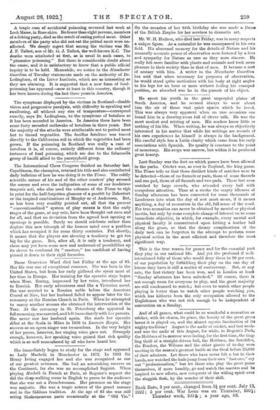The International Chess Congress finished on Saturday last. Capablanea, the
champion, retained his title and also contributed daily bulletins of how he was doing it to the Times. The coldly scientific nature of his and of the other masters' play aroused the sorrow and even the indignation of some of our laudatores temporis acti, who also used the columns of the 'Times to sigh in print for the half-forgotten glamour of a gambit by Zultertort or the inspired combinations of Morphy-or of Anderssen. But, as has been very sensibly pointed out, all that the present " conventionalized " system of play means is that the early stages of the game, at any rate, have been thought out once and for all, and that no deviation from the agreed best opening or openings is possible. Surely we should celebrate rather than deplore this new triumph of the human mind over a problem which has occupied it for some thirty centuries. Put shortly, it means that the players are showing a tendency to get too big for the game. But, after all, it is only a tendency, and chess may yet have some new and undreamt-of possibilities up its sleeve to confound its "masters," too confident of having pinned it down to their rigid formulas.


































 Previous page
Previous page